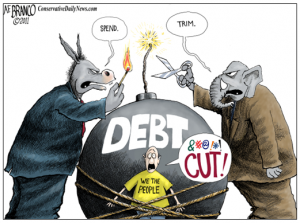
While Presidents Franklin D. Roosevelt and Johnson did what they thought best for the nation at the time, they must have known that to inject even a little government spending into peoples’ personal lives would only lead to more spending and a new kind of government dependency.
And that is exactly what has happened. Almost 60 percent of all federal spending is now dedicated to so-called “mandatory” spending, which includes entitlement programs like Medicare and Social Security. In 1960, entitlement payments accounted for well under a third of the federal government’s total outlays, according to the Wall Street Journal.
Because this government largesse can no longer be afforded, entitlement programs are in trouble. Projections have shown that if not dealt with Medicare as we know it might not be around in the next decade, with the trust fund set to run out in 2024.
Both sides of the political aisle see fit to fund a federal health insurance program for America’s seniors, and both sides champion a need for some kind of reform to save it.
Though they may take a different approach to addressing this program, they do agree with the basic premise that this and other entitlement programs are necessary and should be saved — and that is a problem.
During the Republican National Convention both Rep. Paul Ryan and presidential candidate Mitt Romney spoke personally of the need to reform Medicare and the importance of that program.
However, their eagerness to reform this program is in stark contrast to their predecessors in Congress in 1965. Republicans didn’t support Medicare in Johnson’s era fearing it was a step closer to socialism.
It now seems the need to reform this massive government-spending program is at the heart of the Republican platform.
How do Republicans champion a platform of limited government and in the same breath call for tinkering with a huge Big Government program? If limited government does indeed mean less government involvement in peoples’ lives, wouldn’t Republicans be acting on ways to wean the American people off programs like Medicare?
When two political parties are admitting to a need for a government-run program and are only battling on ways to reform it, one of those parties is going to become obsolete. Why do voters need two political parties with little difference between them — the party that champions Big Government and the party that wants to readjust and reform Big Government? That’s not going to sell well.
Republicans can’t take this election lightly. If preaching from a true platform of limited government, they’ve got to do more than just reform programs.
If Romney becomes the next president and the state of the economy doesn’t change and government spending doesn’t decrease, it could very well be the last time Republicans take a turn in the majority. Another political party will rise that is in opposition to the status quo and the Republican Party could have a very similar history to that of the Whig Party, which it replaced.
Addressing entitlement spending is just the tip of the iceberg for Republicans. They’ve got their work cut out for them should they win the majority in November. For now their talking points have got to become stronger and different than their opposition if they hope to preserve the Party and put America back on a path to prosperity.
Otherwise more than just a political party will be lost.
Rebekah Rast is a contributing editor to Americans for Limited Government (ALG) and NetRightDaily.com. You can follow her on twitter at @RebekahRast.






